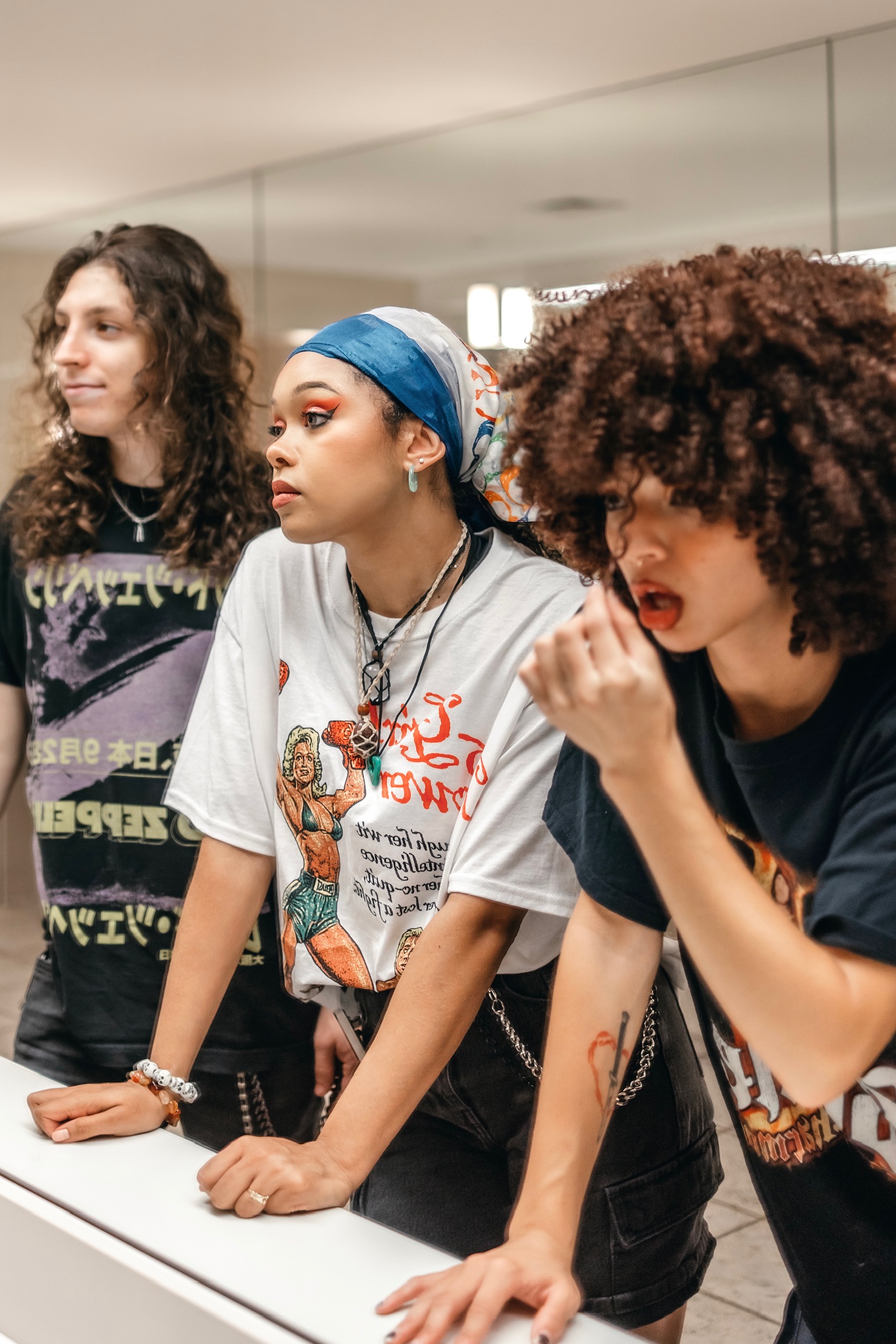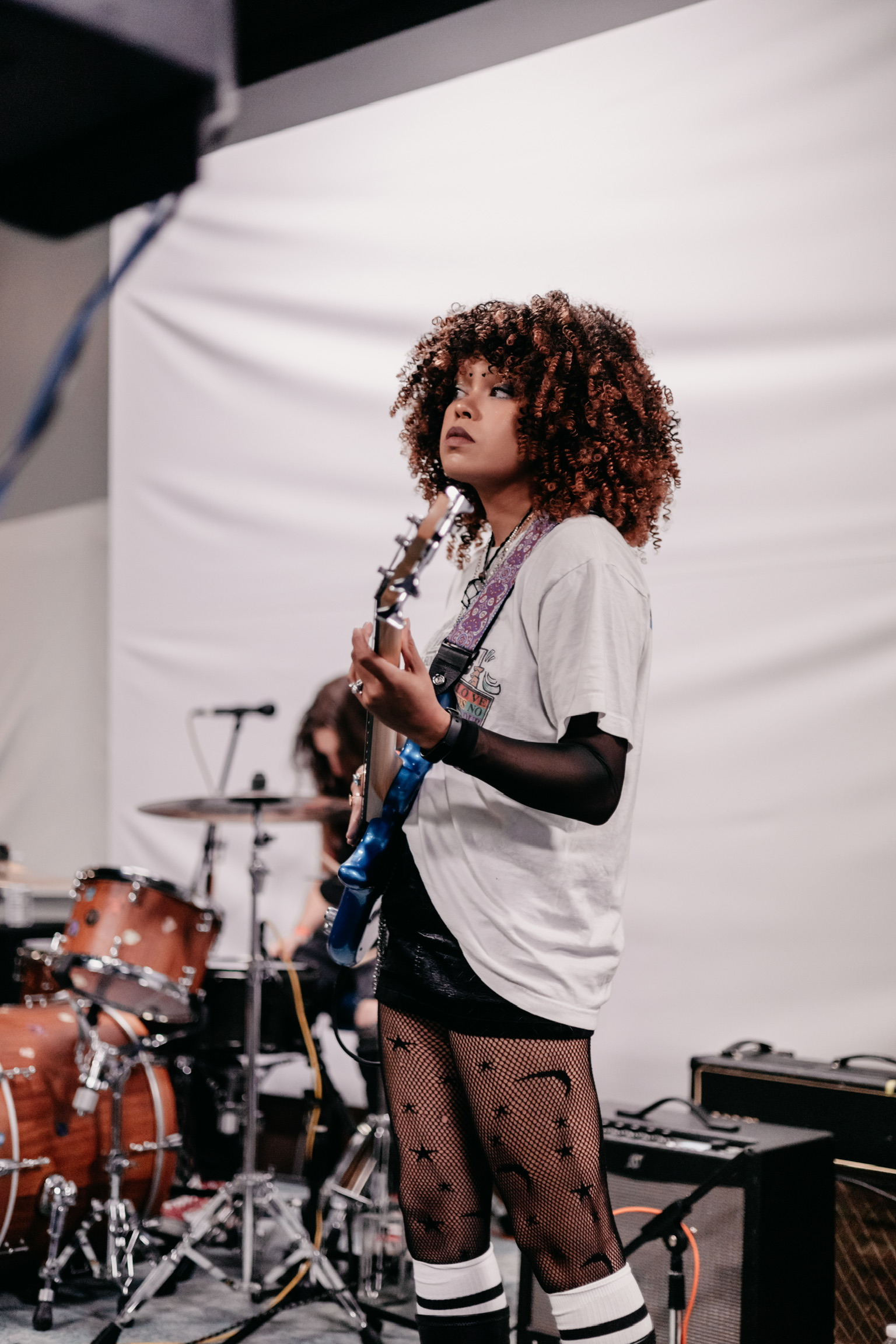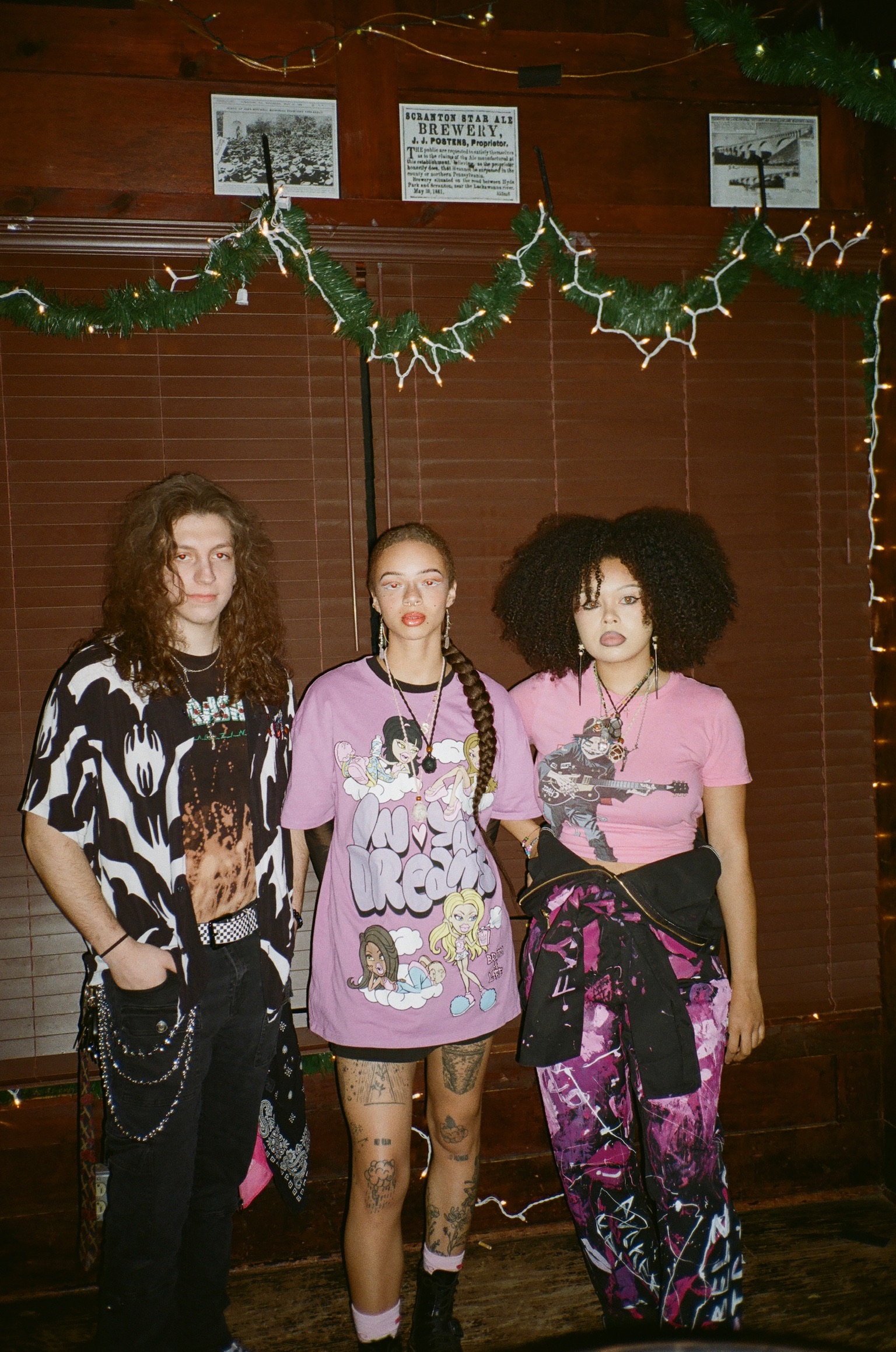The Village
Meet Pucker Up! The punk band for bad bitches
By Ava Pauline Emilione
When Pucker Up! was still in the works, Shug and Demi—the band’s lead singer and bassist respectively—sipped on drinks at The Bog, a beloved local bar in their hometown, Scranton, Pennsylvania. A man approached them soon after sitting down.
“Where are you from?” he asked.
“We’re from here,” Shug said in a raspy voice that defines the band’s punk, Paramore-influenced sound.
“No, like…where are your parents from? Are you guys Creole?”
Demi and Shug, who just wanted to enjoy their Blueberry Thrill beer and Doc’s Draft Pear Cider in peace, endured the man’s lengthy explanation of the Creole people. Creole folks were light-skinned, the man said, just like them, and hailed from the South. Shug and Demi had to be Creole, he maintained, and it was them who didn’t understand where they must’ve come from.
“We’re not fucking Creole,” Shug said. Frustrated by the unsolicited DNA test, Shug put her pen to paper and wrote some lyrics down.
Months later, my friend invited me to a punk show at the same bar, which Shug lovingly calls “their favorite place in the world.”
“You have to stay for Pucker Up!” my friend said. “You’ll love them.”
I smiled and nodded, but I had my doubts. I’ve been a rock music fan since I was fourteen years old. I grew up with legendary emo bands like Pierce the Veil, Sleeping with Sirens, and My Chemical Romance. I liked most punk songs, but truly loved very few—who could ever hope to live up to the nostalgic greatness of Warped Tour?
Scranton is a predominantly white town with a notable Republican stronghold, so I was surprised to see Black girls on stage threatening to punch racists as the crowd moshed and sang along. Of course, I loved every moment. Their performance was electrifying, ballsy, and absolutely fucking metal.
Recently, I sat down with Pucker Up! right before one of their Booked by Bratz shows, an initiative founded by Shug and Demi to organize DIY shows at local venues. We spoke about their origin story, how the band navigates representation, and their broader impact on the alternative music community.
Pucker Up! began during what Shug calls a “feral summer,” when all three of the band’s members got their hearts broken. Since their inception in 2023, Pucker Up! has played at large local events like the Steamtown Music Awards as well as infamous venues like NYC’s Trans Pecos and Philly’s Ruba Club. However, this compelling trio is doing far more than selling out shows.
At the 1977 Modern Language Association’s Lesbian Literature Panel, Audre Lorde spoke on the necessity of resisting silence in the face of fear. In this speech, called “The Transformation of Silence into Language and Action,” Lorde asked the crowd, “What do you need to say? What are the tyrannies you swallow day by day and attempt to make your own, until you will sicken and die of them, still in silence?”
Pucker Up! refuses to swallow life’s tyrannies: the men who interrogate them about their ethnicity in safe spaces, the strangers who put fingers in Black hair without permission, or the past relationships that ended in heartbreak and betrayal. Instead, this band spits the colonial, fascist ooze onto the stage floor, leaving the mosh pit to flatten the mainstream horrors to a bloody pulp.

Left to Right: Tanner, Demi, and Shug
Photo by Kristen Chesek
Although punk is commonly thought to be a subculture for edgy white men who drink Monster and punch holes in the wall, Black musicians such as Don Letts, Death, and Mykki Blanco have contributed to the genre since its inception. Punk’s most fundamental themes, which include DIY shows, nonconformity, and resistance against systemic oppression, directly tie to the ongoing struggle for oppressed people’s liberation. Alternative genres like rock and punk can shatter the silence imposed on marginalized people, crying out from the deepest corners of our hearts and journals. For example, Pucker Up! expresses their solidarity with Palestine in “RIVER AND SEA,” a song from their most recent album I HARDLY KNOW HER. Through lyrics exposing the hypocrisy of Western apathy towards the genocide of Palestinians (There’s a genocide over the sea/What does it have to do with me?), the trio pays homage to the likes of Mannequin Pussy and Propaghandi with its anti-colonial stance. In a sub-culture where white folks have the most access to creative resources and industry representation, Pucker Up! also provides much-needed visibility for Black girls who love alternative music—the very representation that Shug and Demi wished they had during their own coming of age.
“My older brother was huge in the skate scene back in the day,” Demi says. “So I would just tag along with him as an annoying little sister. I never saw women in the music scene. I never saw people of color in the music scene. I didn’t even know that was a thing.”
“We didn’t really see people that looked like us [growing up], so it’s cool that we are the people that look like us now,” Shug says. “There’ve been so many cool instances of when teenage girls come to [our] shows and they’re like, ‘You guys look like me. I’ve been looking for a band that looks like me!’”
Their practice carves out a space for folks of all backgrounds to feel seen and heard through their music. For instance, even though Tanner is a white man who is more widely represented in punk music, his role in Pucker Up! allows him to be more involved in the creative process than ever before.
“I’ve been a musician for quite some time…[In] all of my projects, since I’m the drummer, nobody really asked the drummer if they have any ideas to bring to the song,” he says. “But one thing I’m very thankful of Shug and Demi [for] is that they allow me to be a little bit more of a musician creatively, [allowing] me to be like ‘Oh hey, I have a cool guitar part or a cool bass riff or I have this really cool drum part,’ and I can bring it to the table.”
This collaboration allows for representation not just along the lines of identity, but through the musical practice, where drummers often perform in the background.
“It’s definitely allowed me to grow musically and mentally,” he says.

Pictured: Demi
Photo by Kristen Chesek
Representation in music goes far beyond diversity metrics and corporate DEI initiatives—it carries an undeniable potential for healing. Music activates deep-seated parts of the brain that allow us to form positive memories, reduce pain perception, and even treat cardiovascular disease. With each show performed and song written, Pucker Up! is tending to the physical and mental health of their fanbase, many of whom are people of color, queer, or live outside of urban centers.
While Shug isn’t always conscious of how her race plays into her songwriting, she acknowledges that moving through the world as a Black woman “seeps into everything that we do. The way that I experience love is as a Black woman. The way that I experience heartbreak is as a Black woman,” she says. “The way that I express my pain is sometimes through the lens of, ‘How can I say this without being perceived as more aggressive or angry than I feel that I am allowed to be?’ Because I am a Black woman and there is that preconceived notion.”
Pucker Up! offers no apologies for expressing Black feeling in all of its bass and drum-driven glory. “HUMILIATION,” where Shug unpacks an avoidant, toxic situationship through kink metaphors (You’re holding me like CBT, and I don’t mean psychology/You’ve got me by the balls honey, I don’t know if you’ll let go of me), is one of my favorite Pucker Up! songs and a much-needed catharsis in the humiliating age of online dating. “CRY BABY,” which expresses the hypocrisy of a partner who puts you through hell only to cry about the pain of hurting you, is another must-listen. Pucker Up!’s expansive discography simultaneously reveals the uniqueness of a Black woman’s experiences and the universality of human heartbreak and rage.
Western culture, even alternative culture, has always feared Black pain. Listening to a Black woman say that she is sad, pissed off, or heartbroken requires us to acknowledge our role in upholding a culture that excludes and questions Black women without mercy. Pucker Up! has experienced this exclusion and harassment firsthand. During our conversation, I watched the band’s typically cheery faces fall as they told me about a grueling Halloween set, where they were heckled by literal skinheads at a house show. After their performance, the hecklers, who were also in a band set to perform that night, got on stage and began chanting that horrible, bone-chilling slur Black people know and despise: N*gger. Partygoers who were seeking an inclusive, spooky night quickly evacuated the house. Shortly after the show, the concert organizers removed the band from all their bills.
“That was the first we’d ever heard of them, and the last we’ve ever heard of them,” Shug said. “Even though [Scranton] is a predominantly white community, the folks in it are good people…they don’t tolerate bullshit.”
"Pucker Up! refuses to swallow life’s tyrannies. Instead, this band spits the colonial, fascist ooze onto the stage floor, leaving the mosh pit to flatten the mainstream horrors to a bloody pulp."
Shug, Demi, and Tanner are well-known and widely loved in their native city. On local Reddit forms, Pucker Up! is repeatedly cited as one of the best bands in the area, and their Instagram comments are packed with praise from dedicated fans. The trio, committed to building meaningful relationships in their neighborhood, return the love tenfold.
“We’re not gonna pull up to a show and act like fucking cool guys,” Demi says. “We have a really important message…but our shows are an experience just for everyone to gather and have fun.”
Their Booked by Bratz shows in particular create opportunities for lesser-known local artists while resisting homogeneity in creative spaces.
“We’re very hyper aware of when shows kind of look all the same and the people kind of look all the same, [and] they all sound the same,” Shug says. “We want the shows to be different and look different and still be a really good time. I think that Booked by Bratz is what a safe space looks like.”
I attended a Booked by Bratz show that was open to all ages and included a wide range of musical talent. Ivy, an indie singer-songwriter and poet, performed cathartic tunes that brought to mind some of my past heartbreaks and tragic situationships. Tumbleweed built a dynamic soundscape with impressive guitar riffs and drum parts. Somehow Else, my personal favorite from the night, was one of the youngest bands I had ever seen perform, shredding onstage like lifelong performers despite being under eighteen. The best part of it all: No audience member was turned away from the show for lack of funds.

Left to Right: Tanner, Shug, and Demi
Photo by Bedford Towers
“One of my most favorite parts about music is that it includes everybody, no matter what, and it gives everybody a safe space and a home,” Tanner says.
Booked by Bratz is a direct manifestation of Pucker Up!’s ethos that inclusivity doesn’t end at calling for broader representation of race and gender identities in music—it means booking out physical spaces and inviting musicians of all genres, sounds, and ages to play on their own terms.
“We want everyone to have a stage to perform on,” Demi says.
Pucker Up!, like their punk ancestors, resists a culture that prevents creators from making noise or raging against the system. In a world where media outlets and corporations only promote diversity to avoid being cancelled, the band is resisting the notion that bands have to look or sound a certain way to be heard. Demi jokingly refers to the trio as “father figures,” but the metaphor isn’t too far off. This band is giving birth to some gorgeous and necessary creations.
“[Pucker Up!] really is our diary…it’s our outlet and it’s our way that we comfort each other and ourselves and our way that we have fun and we see new places,” Shug says.
In the coal-rich mountains of northeast Pennsylvania, Pucker Up! is shoving their mic into a new alternative culture: one that is multiracial and queer. One that doesn’t take shit from anyone. One that doesn’t only focus on creators in New York, Atlanta, and Los Angeles, but honors talent in smaller towns and cities. One that creates a space for everyone to come together, mosh, and sing at the top of their lungs in vital catharsis. One that, in the words of Pucker Up!, is about being a bad bitch and having fun.
“We really just do this shit because it’s who we want to be and what we are. It’s never going to be a corporate commercialized thing,” Shug says. “This is our hearts.”
Edited by Cecilia Innis
The raw truth! So proud of Pucker Up! This is a very well written piece of journalism.
Thank you Ava, this is fantastic. And thank you, Demi, Shug and Tanner for being the future of our local (for now!) scene. ❤️👍🏽👊🏼😎👏
By far one of the most well-deserved bands to have an article so eloquently representing them. Pucker Up! may be a badass team of gals and Tanner; but their soft spots for children and protecting them at their shows are evident. If there is one truth I will have in this lifetime, and one manifestation I can be sure to come to fruition.
Pucker Up! will become a worldwide phenomena, and while we in NEPA will miss them greatly- oh how much the world will love them as we do.
And how excited we all will be to keep welcoming them all back home with open arms.